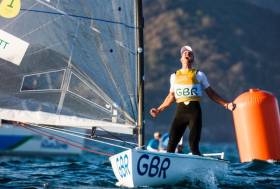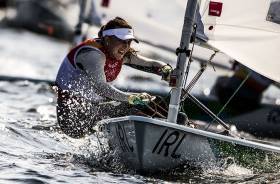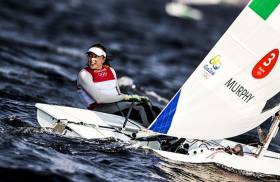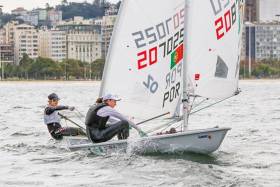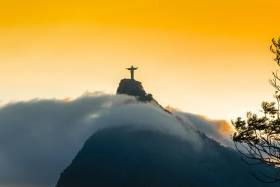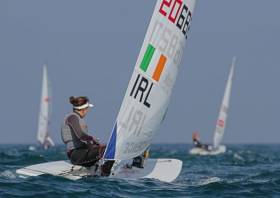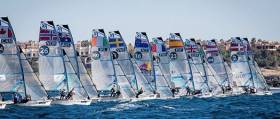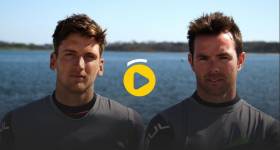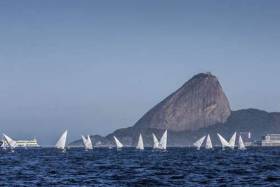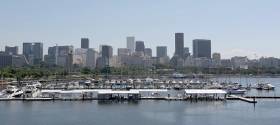Displaying items by tag: Rio
GBR Giles Scott Assured Finn Gold With a Race to Spare
Giles Scott (GBR) has assured himself of gold after another brilliant performance that leaves him 24 points clear at the top after the fifth day of racing at the Rio 2016 Olympic Sailing Competition. Vasilij Zbogar (SLO) is second, 13 points ahead of Ivan Kljakovic Gaspic (CRO). Once again, Rio’s challenging conditions provided a mixed bag of results, with several sailors picking up high scores. There is now just the medal race to sail.
With no clear form through the fleet apart from Scott and Zbogar, it was always going to be a scrap to the finish, with the points around the medal race cut off very, very close. For the fifth day in a row it was all change once again.
After a long postponement, first ashore and then afloat to wait for the wind, Kljakovic Gaspic started his day leading round the top mark in race 9, in very light winds. He was passed on the second upwind by race 1 winner, Facundo Olezza (ARG), who maintained the lead, by mere seconds, all the way to the finish. Alejandro Foglia (URU), who had rounded the top mark in 15th, finally found his speed to cross in third.
Foglia then went on to win Race 10, started in slightly more wind, after overtaking Scott on the final downwind. Caleb Paine (USA) had rounded first but dropped to fourth while Ioannis Mitakis (GRE) ended the race where he started, in third.
To make sure of the gold today, Scott had to gain three points on Zbogar. In the first race of day, he looked to have opened out a nice margin, only to loose ground on the second upwind and finish just one place ahead. But the margin had increased to 18 points and most of his other rivals had high scores.
So in the final race, Scott just had to finish more than two boats ahead of Zbogar to win the gold with a race to spare. For a while Zbogar was right behind Scott, but a few errors on the second upwind let Scott escape, and the gold was gone.
Meanwhile Olezza followed up his race win with a seventh to climb back in to the top 10 again. A last place for Jake Lilley (AUS) in race 9 initially dropped him out of the medal race, after going into the day in third, but after Pieter-Jan Postma (NED) was disqualified from race 10, Lilley gains one point to overtake Ioannis Mitakis (GRE), and was back in the medal race.
In addition, both Paine and Max Salminen (SWE) have closed on the top and are now within striking distance of the podium.
Asked what it meant to him to win the Olympic title, a normally unemotional Scott said, “I know what it meant to me because of the way it made me feel towards the last stages of that final race. I just found myself welling up and in tingles as it slowly dawned on me what I'd done. I wouldn't put myself down as the emotional sort but I had a little cry to myself, which I like to think I don't do that often. Just the emotions that come out of you in that situation you can't prepare yourself for. It's been amazing.”
"When we put the campaign together after London, Matt [Howard], my coach and I we decided that we wanted to campaign flat out. We weren't going to go soft in any regattas and everything we went to, we wanted to win and win it in style.”
"That approach is great but it does put a target on your back. Especially two or three years out that target inevitably gets closer as everybody ups their game. To have been able to maintain that gap enough into the Olympics with a race to spare - it gives great justification to those decisions earlier on.”
A clearly exhausted Zbogar commented, “It was a really difficult day, really stressful because the wind was up and down. Puffs of wind were all over the race area and it was impossible to predict, so very tough mentally. I tried to be conservative playing the middle, and I lost a few places there in both races. But at the end I think I managed to have two good races, which was really good in these conditions.”
“In the first race if there were not the big waves, it would have been easy sailable, but the waves made it almost impossible. It was up and down and was a bit of a lottery at the end. And many guys were ahead and in a few moments lost everything.”
Foe the first time in the regatta, Kljakovic Gaspic has moved into a podium position. “The first race was quite light, but for me was regular. There were big differences in the downwind in pressure and positions so it was not easy to sail. I was lucky being extended on the front so I didn’t have this headache, but for other guys it was quite tough.”
“The second one was tragic for me. I was just getting extra points for nothing and making my life more complicated that it should have been. Right from the start everything started to get complicated and when racing gets complicated it’s never good. And then the wind picked up and distances got that much bigger and it got harder to recover. On the second beat I went on the left side to get more pressure and it didn’t come, and lost even more places.” He finished 13th.
“But at the end of the day I am still in a good position. I need to sleep and relax and get ready for Tuesday.”
Scott still must sail the medal race, but the result is irrelevant. He cannot be beaten. Mathematically, any boat in the top 10 can win a medal, but that would need some letter scores. Zbogar is almost secure for a medal. To lose a medal, he would have to be last, with Paine or Max Salminen (SWE) winning. Kljakovic Gaspic in third, is just five points ahead of Paine and Salminen, so the question is will he attack for silver or try to defend the bronze?
The medal race is scheduled for 13.05 on Tuesday 16 July. It might even be on TV, if you are lucky.
In an unstoppable performance from Ireland's 'Breeze Queen', Annalise Murphy was again at the top of her Rio Olympic fleet at the half way stage of the Laser Radial regatta today. It puts Annalise (unofficially) third overall, just two points behind Holland and China.
In the waters of the South Atlantic Ocean, the Dubliner recorded another top five result, her third top five result of the regatta so far.
Sitting in second overall after four skilful races sailed, the Dubliner went again in the Women’s laser radial today on the outside Cocapana course with 19-21 knots from the west, ideal conditions for the Irish helmswoman.
Wearing the silver/blue jersey to denote her place overall, Annalise rounded the first mark in fifth in the 37–boat fleet, about one minute behind leader, Marit Boumeester of Holland.
The top five established a big lead and within that group Annalise moved into fourth behind leaders NED, DEN and USA. It appears that Annalise unfortunately lost out in a reaching duel with Croatian Tina Mihelic in the closing stages and finished fifth and not fourth as reported earlier.
After that, those following the race across the world on the online tracker were frustrated when technology failed!
The Radial course today was trapezoid, which included two short reaches along with windward-leeward legs. Two laps on the Windward-Leeward section were sailed.
The provisional finishing order was Marit Bouwmeester (NED) in first followed by USA, DEN, CRO, IRL, GBR, SWE and CHN.
World Sailing continues to struggle with its results system. Results by Rio organisers are here.
There's another couple of 12–knot races in prospect for Annalise Murphy in the Olympic Laser Radial class today. But after that all similarities will end for the sailors as today's races five and six are on the Copacabana course which is outside the bay and at sea. It's a crucial stage as the regatta passes the half–way stage. The race area is subject to tidal conditions and winds are expected to be different to anything seen on the first two days, perhaps a little more like Annalise's home waters of Dublin Bay?
Annalise has been training in Rio on at least ten occasions over the past four years and will be familiar with all the course locations being sailed this week.
Start time is 5:10 Irish time. No TV coverage again.
Irish Olympic Sailing Team Profiles for Rio
The chances of winning an Olympic sailing medal next month, have been described by Team manager James O'Callaghan as an 'outside shot'. Can Ireland's four boat Irish Olympic Sailing Team deliver on the 36–year medal drought? Afloat.ie gives its assessment boat by boat
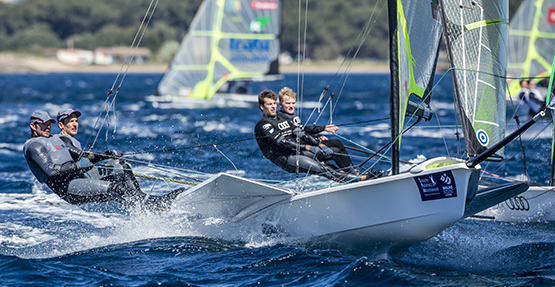 Belfast Lough's Ryan Seaton and Matt McGovern start racing in Rio on August 12
Belfast Lough's Ryan Seaton and Matt McGovern start racing in Rio on August 12
49er – Ryan Seaton & Matt McGovern
Ryan Seaton and Matthew McGovern have been steadily working their way up the world rankings this year, from 22ncd at the start of the year to 11th in the latest version. These London 2012 veterans (14th) have put in some stellar performances in recent months, most notably winning the Princesa Sofia Regatta in Palma in April.
Seaton and McGovern qualified Ireland at the first possible opportunity at the combined World Championships in Santander in 2014, finishing 8th. But their performance since has been erratic and the win in Palma was bookended by a 37th in Miami and a 28th at the 2016 Europeans. Most recently, at the international sailing week in Rio, the Belfast pair finished down the fleet, but may have been using this regatta for testing or training purposes.
There is no doubt, that on their day, Seaton and McGovern can compete with the world's best.
Men’s Skiff (49er) 20 competitors Race duration: 3 x 30 minutes daily (medal race 1 x 20 minutes) Competition days: Fri 12th/Sat 13th/Sun 14th (Reserve)/Mon 15th/Tue 16th/Wed 17th (Reserve)/Thu 18th - medal race/Fri 19th (Reserve)
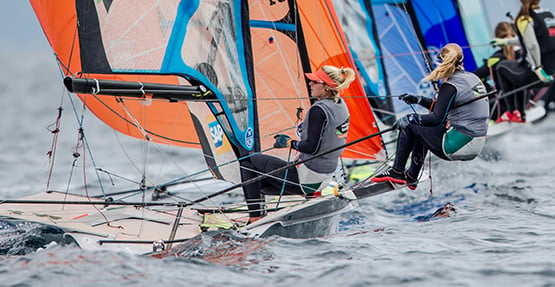 Dublin Bay's Andrea Brewster and Saskia Tidey start racing in Rio on August 12
Dublin Bay's Andrea Brewster and Saskia Tidey start racing in Rio on August 12
49erFx – Andrea Brewster & Saskia Tidey
Andrea Brewster and Saskia Tidey were the last of the Irish team to qualify, enduring heartbreak at the 2015 worlds where they were denied qualification by a protest in the final race report here. However, their performance at the Worlds was good enough to secure the next available place a few months later when no team from Africa emerged. Story here.
Brewster, a product of the British Olympic Laser radial squad, and Tidey, who transitioned from the Radial to the 49er following a season racing 18ft Skiffs in Sydney, have, until this year, hovered in the early 20s in world ranking and results at major events. 2016 has been something of a breakthrough for the Royal Irish duo, finishing in the teens more consistently, including a 12th at the European championships in Barcelona in April. A final day scoreline of 2,1,3 shows the potential that resides in this team.
Women’s Skiff (49erFX) 20 competitors Race duration: 3 x 30 minutes daily (medal race 1 x 20 minutes) Competition days: Fri 12th/Sat 13th/Sun 14th (Reserve)/Mon 15th/Tue 16th/Wed 17th (Reserve)/Thu 18th - medal race/Fri 19th (Reserve)
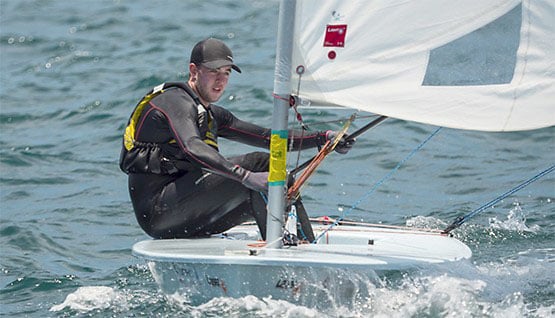 Dublin Bay's Finn Lynch starts racing in Rio on August 8
Dublin Bay's Finn Lynch starts racing in Rio on August 8
Laser – Finn Lynch
Finn Lynch's fairytale journey to Rio is recounted in Sailing on Saturdays by Winkie Nixon. However he had to overcome the 2012 Olympian James Espey, who's 38th place at the 2014 world Championship in Santander qualified the country. ISA imposed a three regatta trials system, starting with the Copa de Brasil regatta in Rio in December 2015, where Espey shaded Lynch by one place. At the next event in Palma in March and April, neither sailor made gold fleet, but Espey increased his advantage with a 53rd to Lynch's 58th. Going into the final trial, the 2016 Laser Worlds in Mexico in May, Lynch had it all to do, but a solid series of consistent results saw him qualify for the Gold Fleet, while Espey never really got off the ground until it was too late.
While Lynch, who's best results have been at under age events, is certainly not a favourite for podium in Rio, his trajectory suggests that a medal in Tokyo in 2020 is well within his capability.
Men’s One-person dinghy (Laser) 46 competitors Race duration: 2 x 50 minutes daily (medal race 1 x 25 minutes) Competition days: Mon 8th/Tue 9th/Wed 10th/Thu 11th (Reserve day)/Fri 12th/Sat 13th/Sun 14th (Reserve)/Mon 15th - medal race/Tue 16th (Reserve)
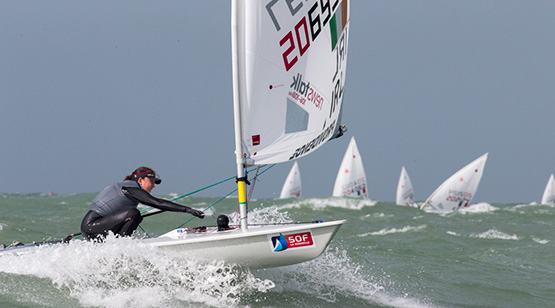 Dublin Bay's Annalise Murphy starts racing in Rio on August 8
Dublin Bay's Annalise Murphy starts racing in Rio on August 8
Laser Radial – Annalise Murphy
Currently perhaps Ireland's most famous sailor, Annalise Murphy dismissed the challenge of Aoife Hopkins in the three event trial. However, recent form contradicts her suggestion that she is one of eight in the fleet with the potential to win a medal in Rio. Since January, her results at major events have been 48th (Miami World Cup), 30th (Laser Europeans), 39th (Laser Worlds) and 34th (Weymouth World Cup). The historical profile of light and fickle winds at the Olympic venue suggests that Annalise, a heavy weather specialist, will struggle to make the medal race. The 2013 European champion has, however, surprised on many occasions before and as recently as this month scored an important win on Olympic waters in her last regatta before the Games at the Rio de Janeiro International Sailing Week. Results of that win are here.
Women’s One-person dinghy (Laser Radial) 37 competitors Race duration: 2 x 50 minutes daily (medal race 1 x 25 minutes) Competition days: Mon 8th/Tue 9th/Wed 10th/Thu 11th (Reserve day)/Fri 12th/Sat 13th/Sun 14th (Reserve)/Mon 15th - medal race/Tue 16th (Reserve)
Afloat.ie has charted the progress of the 2016 Olympic sailing team over the last four years in a dedicated Irish Olympic Sailing section
Sailors & Rowers Named on Team Ireland for Rio Olympics
The Olympic Council of Ireland (OCI) has confirmed the final Team Ireland squad that will compete at the Rio 2016 Olympic Games this summer.
This is Team Ireland’s largest delegation since 1948; 77 athletes, of whom 26 are women, will compete across 13 sports including sailing and rowing.
OCI President and IOC Executive Board Member Pat Hickey said: “We are delighted to confirm our 77-strong squad for Rio 2016, the first ever Olympic Games in South America.
“I am personally very excited about what we can achieve in Brazil; this will be the best prepared Team Ireland to ever attend an Olympic Games.
“And I know the Brazilian people, renowned for their passion, will deliver a memorable Games.
“I wish all our athletes every success and I am positive they will do the country proud.”
Team Ireland’s Chef de Mission for Rio 2016 Kevin Kilty said:
“The moment we’ve all been waiting for has finally arrived; the Team Ireland line-up for Rio 2016 is complete.
“With 77 athletes competing across 13 sports, I can honestly say Rio 2016 will be one of the most diverse and exciting Olympic Games for Team Ireland.
“Congratulations to all the athletes, coaches and performance staff for your hard work on this four-year journey. I look forward to seeing you all in Rio and wish you all the best during the next few weeks.”
See the full Team Ireland line-up for Rio 2016 below:
Athletics
Robert Heffernan - 50km and 20km men’s race walk
Brendan Boyce - 50km and 20km men’s race walk
Alex Wright - 50km and 20km men’s race walk
Lizzie Lee - women’s marathon
Fionnuala McCormack - women’s marathon and 10,000m
Breege Connolly - women’s marathon
Mick Clohisey - men’s marathon
Paul Pollock - men’s marathon
Kevin Seaward - men’s marathon
Mark English - men’s 800m
Thomas Barr - men’s 400m hurdles
Ciara Everard - women’s 800m
Ciara Mageean - women’s 1,500m
Kerry O’Flaherty - women’s 3,000m steeplechase
Michelle Finn - women’s 3,000m steeplechase
Sara Treacy - women’s 3,000m steeplechase
Tori Pena - women’s pole vault
Badminton
Scott Evans - men’s singles
Chloe Magee - women’s singles
Boxing
Michael Conlan - men’s 56kg
Paddy Barnes - men’s 49kg
Joe Ward - men’s 81kg
Stephen Donnelly - men’s 69kg
Brendan Irvine - men’s 52kg
David Oliver Joyce - men’s 60kg
Katie Taylor - women’s 60Kg
Michael O’Reilly - men’s 75kg
Cycling
Dan Martin - men’s road race
Nicholas Roche - men’s road race
Shannon McCurley - women’s keirin
Equestrian eventing, dressage and jumping
Equestrian eventing
Clare Abbott with Euro Prince
Jonty Evans with Cooley Rorke's Drift
Mark Kyle with Jemilla
Padraig McCarthy with either Simon Porloe or Bernadette Utopia
Travelling reserve: Camilla Speirs with Portersize Just A Jiff (HSI Financed)
Equestrian dressage
Judy Reynolds with Vancouver K
Equestrian jumping
Greg Broderick with MHS Going Global
Golf
Padraig Harrington - men’s golf
Seamus Power - men’s golf
Leona Maguire - women’s golf
Stephanie Meadow - women’s golf
Gymnastics
Kieran Behan - artistic gymnastics all-around
Ellis O’Reilly - artistic gymnastics all-around
Hockey
Jonny Bell
Chris Cargo
Peter Caruth
Mitch Darling
Paul Gleghorne
Kyle Good
Ronan Gormley
David Harte (captain)
Conor Harte
John Jackson
John Jermyn
Eugene Magee
Shane O’Donoghue
Alan Sothern
Kirk Shimmins
Michael Watt
Reserves
Tim Cockram
Michael Robson
David Fitzgerald
Modern pentathlon
Arthur Lanigan-O’Keeffe
Natalya Coyle
Rowing
Sinead Lynch - women’s lightweight double sculls
Claire Lambe - women’s lightweight double sculls
Paul O’Donovan - men’s lightweight double sculls
Gary O’Donovan - men’s lightweight double sculls
Sanita Puspure - women’s single sculls
Sailing
Annalise Murphy - Laser Radial
Finn Lynch - Laser
Ryan Seaton - 49er
Matt McGovern - 49er
Andrea Brewster - 49erFX
Saskia Tidey - 49erFX
Swimming and diving
Fiona Doyle - women’s 100m and 200m breaststroke
Oliver Dingley - men’s 3m springboard diving
Nicholas Quinn - men’s 100m and 200m breaststroke
Shane Ryan - men’s 100m backstroke; 50m and 100m freestyle
Triathlon
Aileen Reid - women’s triathlon
Bryan Keane - men’s triathlon
How Irish Sailing Teams Qualified for Rio Olympics
The 32–month long Olympic sailing qualification process, incorporating events ranging from Takapuna to Toronto, has concluded with 380 athletes sailing 274 boats that will represent 66 nations in Rio de Janeiro this August.
One nation per event
This process, devised by World Sailing in consultation with the International Olympic Committee (IOC), prioritises performance with later places allocated in accordance with the IOC's principle of universality. With only one nation permitted per event, it can be argued that the process does not allow the Olympics to showcase all the world's best sailors, but the alternative is to have the fleet filled with the top sailors from a smaller number of countries, opening the possibility of a clean sweep of medals by one nation. The Finn, for example, has been a happy hunting ground for British sailors three of whom have won seven out of the last ten Finn Gold Cups. It is not inconceivable that, were multiple entries from a single nation allowed, then GBR could own the podium in this class at least.
Ireland qualifies three at first opportunity
The first qualifying opportunity was at the combined World Championships in Santander in September 2014 where half of the places available for Rio were secured. Ireland's sailors were successful in achieving qualification in the One-person Dinghy Men and Women and the Skiff Men events in Santander.
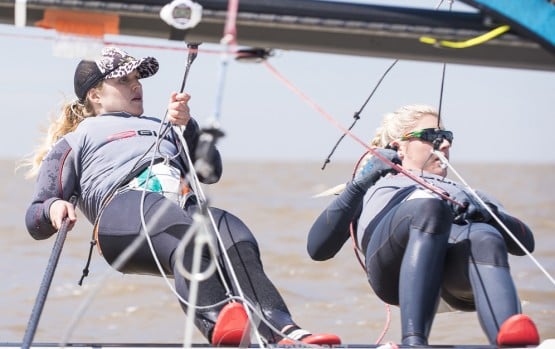 Andrea Brewster and Saskia Tidey confirmed for Rio next month Photo: B Gretz
Andrea Brewster and Saskia Tidey confirmed for Rio next month Photo: B Gretz
Ireland gets African slot
Remaining performance places were allocated to the 2015 Class World Championships and a series of Continental Qualification Events sanctioned by World Sailing, to finish by 1 June 2016 at the latest. Brazil, as host country, get an automatic entry in each event, while 4 places, 2 each in the Laser and Laser Radial classes are reserved for allocation by IOC to smaller nations. The Irish 49erFx qualified through the 2015 Worlds when the place reserved for Africa was not used, thus increasing the original number of places available from the Worlds.
Quality or Quantity? - Some countries reject their places
Things got even more complicated this year as seven countries (Australia, Austria, Canada, Croatia, Germany, New Zealand and Sweden) have decided not to send sailors in qualified classes, thus opening the door for countries lower down the pecking order. In at least three of these countries appeals against these decisions were dismissed by higher authorities. But social media continues the debate and it is sure to be a topic for some time to come.
Lynch overturns Espey, Murphy stays on course
Ireland, in common with many countries, put in place an additional selection system to determine the individuals that would be chosen for Rio. Finn Lynch defeated James Espey in the Laser class to secure selection, while Annalise Murphy held off the challenge of Aoife Hopkins in the Laser Radial. There were no challengers to the Skiff teams of Seaton/McGovern and Brewster/Tidey so these pairs travel to Rio.
Events & Equipment
While sailors traditionally refer to the class of boats they sail, IOC/World Sailing first define events, then equipment as per the following table:
| Event | Equipment | Total Places | 2014 WC | 2015WC | Continental Places | ||
| Men | Women | Mixed | Fleet M/W | ||||
| Windsurfer | RS:X | RS:X | 36/26 | 18/13 | 6/6 | 11/6 | |
| One-person dinghy | Laser | Laser Radial | 46/37 | 23/19 | 9/4 | 11/11 | |
| Heavyweight one-person dinghy | Finn | 23 | 12 | 4 | 6 | ||
| Two-person Dinghy | 470 | 470 | 26/20 | 13/10 | 6/3 | 6/6 | |
| Skiff | 49er | 49erFX | 20/20 | 10/10 | 3/3 | 6/6 | |
| Multihull | Nacra 17 | 20 | 10 | 3 | 6 |
Next: In the next article we take a look at the format of the Olympic Regatta.
Irish Olympic Sailing News From Rio on Afloat.ie
Afloat.ie begins a series on the Irish Olympic sailing team in the build–up to August's Rio regatta.
The 32–month long Olympic qualification process, incorporating events ranging from Takapuna to Toronto, has concluded with 380 athletes sailing 274 boats that will represent 66 nations in Rio de Janeiro next month.
Afloat.ie's coverage – always from an Irish point of view – starts with a scene setting overview of Ireland's Olympic Qualification. Coverage continues in the build up to the regatta with details of the Irish Qualifiers in the Skiff Men, Skiff Women, Laser and Laser Radial.
There will be a final assesment of Irish chances followed by regatta reports when Ireland takes to Rio waters on August 8th.
Click: Rio Olympic Sailing
Olympic sailors Ryan Seaton and Matthew McGovern starred in last night's RTE Rio Olympic preview series. The pair sailing in the high–speed 49er skiff class and secured an Olympic spot with a top 10 finish at the 2014 World Championships. But as they reveal in the programme funding issues mean that their preparations for the Olympics are anything but smooth. Check out the programme here
With less than 75 days to go until the opening of the Rio 2016 Olympic Games, World Sailing Chief Executive Officer Andy Hunt and Head of Competitions Alastair Fox this week participated in a final on-site review of preparations for the Olympic Sailing Competition.
Briefings were provided over two days on key operational and service areas for the Olympic Games, including venue construction, competition schedules, broadcasting, media operations, accommodation, transportation and ticketing. A detailed briefing was also provided on the continuing efforts to improve water quality in and around Guanabara Bay, the venue for Olympic Sailing.
The briefings were led by Rio 2016 Sport Sailing Manager, Walter Boddener, and his operations team. Hunt and Fox were joined by Darryl Seibel, who will serve as Chief Press Officer for World Sailing during the Rio 2016 Olympic Games.
The World Sailing delegation also met with Rio 2016 security officials to learn more about steps that can be taken to increase safety for athletes and coaches, particularly during pre-Games training periods. This advice will be shared directly with World Sailing Member National Authorities, according to Hunt.
"We appreciate the work being done by Rio 2016 and its partners to welcome the best sailors from around the world for the 2016 Olympic Games,” said Hunt. "Since our last visit in March, considerable progress has been made in preparing for the Olympic Sailing Competition. Construction at the Marina da Gloria is almost complete and the water quality is noticeably better, particularly in the launch areas around the marina.
"During our review, we had an opportunity to meet with officials from the Mayor's Office and leading environmental authorities to review their latest water-quality data,” added Hunt. "The trend lines are encouraging, but it will be important that not a single day is lost in implementing the remaining measures that are planned, including the installation of a series of new eco barriers.”
"Our primary focus is to make certain the field of play on Guanabara Bay is safe and suitable for all Olympic competitors,” said Fox. "Working with Rio 2016 and various governmental authorities, I'm confident we have the right plan in place to deliver a field of play that is safe and fair. Equally, as with every major sailing regatta, we have detailed plans in place to respond and adapt should conditions change.”
The natural beauty of Rio de Janeiro will provide a spectacular backdrop for sailing, which will enjoy a particularly bright spotlight during the upcoming Olympic Games.
"Brazil has enjoyed tremendous success in Olympic sailing and athletes such as Robert Scheidt, Torben Grael and Marcelo Ferreira hold a special place in Brazil's sporting culture,” said Hunt. "Given this history of success and the profile sailing enjoys in Brazil, it is our hope that the beaches surrounding Guanabara Bay will become one of the truly special places for fans during the Rio Games.”
New Look Sailing Venue for Rio 2016 Olympics
The six member Irish Olympic sailing team will be treated to an overhauled Olympic venue in Rio this August for the Olympic Games Regatta. Marina da Glória has been expanded and modernised, with new leisure facilities aimed at attracting city residents and visitors. It's been a tough time for the organisrs battling a tide of protest over water pollution in Rio waters.
The new-look venue for the sailing events of the Rio 2016 Olympic and Paralympic Games is now fully open to the public and ready for competition. On Thursday city authorities unveiled the modernised Marina da Glória, following a 70 million reais (US$19m) refit.
As well as being expanded and redesigned, the marina has been completely integrated with Flamengo Park, one of the most popular leisure areas in Rio de Janeiro. The marina’s waterfront boardwalk, which used to be accessible only to boat owners, is now open to the public and will be connected to the park.
'Before, the Marina da Glória did not welcome locals. Today, it is a new, revitalised space with its arms wide open for visitors'
Marco Aurélio Sá Ribeiro, president of the Brazilian sailing confederation
As part of the renovation, the capacity of the venue has been significantly increased. The number of berths in the water has gone from 140 to 415 and the number of dry stacks has increased from 70 to 240. The marina’s jetties have been redesigned, new electricity and water infrastructure installed and a modern pavilion for athletes has been completed. A car park with space for 470 cars has been built and security for the boats has been improved.
As well as the investment in new sailing facilities, the marina now contains an extensive leisure area for the general public, including four restaurants, a delicatessen, bicycle path and bike racks. After the Paralympic Games the venue will be used for sports, cultural events and entertainment. The marina will also offer sailing and diving courses as well as boat rentals and will have a special area for fishing.



























